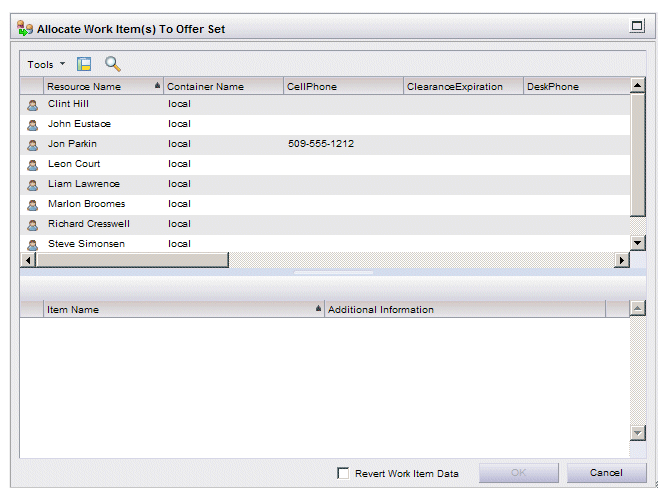allocateWorkItemToOfferSet
This function allows a user to allocate one or more work items to a user from the original offer set, that is, the group of users to which the work items were originally offered. It removes the work items from the user’s work item list, then adds them to the Inbox of the user to whom they have been allocated, with a state of Allocated.
Executing this method causes a dialog similar to the following to be displayed, either in the parent block, or in a dialog, depending on the value passed in the parent parameter:
This method has two signatures: one to allocate a single work item, and one to allocate multiple work items.
This component publishes the closeAssignWorkItems event. The application should subscribe to this event to detect when user has clicked either the OK or Cancel button. At that time, assignments, if any, will have been completed.
Ideally, the component will be displayed modally. If you choose to display it non-modally and allow the same work item to appear in multiple instances, keep in mind that only the first of those to perform an assignment of that work item will succeed. Other instances will get an exception.
Syntax
allocateWorkItemToOfferSet(id, version, state, workType, parent);
allocateWorkItemToOfferSet(workItems, workType, parent);
Parameters
- id - (integer) A work item ID, identifying the work item to allocate to the original offer set.
- version - (integer) Specifies the version number of the work item you want to allocate. The version number indicates how many times the work item has changed state. The version number starts at 0 when the work item is created, and is incremented by one each time it changes state.
- state - (String) Identifies the state of the work item you want to allocate. The possible states are:
- workType - (constant) Identifies whether the work item(s) being allocated belong to the current user’s work set or are from a work set the current user supervises. The possible values are:
- parent - (Object) (optional) Identifies the General Interface component where the interface is to be loaded. If omitted, the interface is loaded in a dialog.
- workItems - (Array<Objects>) These identify the work items to be allocated. Each Object in the array must have the following properties, identifying an existing work item (see above for definitions):

